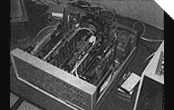

We may earn revenue from the products available on this page and participate in affiliate programs. Learn more ›
The music industry is taking the first small, yet irrevocable, step toward changing how you listen to and share digital music. After years of teeth-gnashing and spitting in the wind, all the major record labels have finally gotten serious about their digital music initiatives, namely by entering into agreements to sell the best stuff from their top artists, including new releases, on the Internet. In fact, the services may be up and running by early fall.
Big deal, you may be thinking. After all, no one is going to come and take away the 40GB of music you have stored on your computer’s hard drive, or magically wave a wand and make your portable MP3 player start looking for copyright information before playing songs. Plus, none of the attempts to make people pay to download or listen to music on the Internet in the years since the introduction of the first portable MP3 player in 1998 has met with anything like overwhelming success.
But take a moment to consider what the record labels are doing. Sony Music Entertainment and Vivendi Universal have teamed up to provide music and video subscription services through a venture called Pressplay. AOL Time Warner (which owns Popular Science), EMI Recorded Music, and Bertelsmann have joined forces with the Internet media delivery company RealNetworks to do the same, calling their enterprise MusicNet. In addition to the big five, many of the independent labels have also signed on with Pressplay or MusicNet. And if that weren’t telling enough, the music licensing arrangements aren’t exclusive to either service. So there’s the potential for both services to provide music from all labels.
Admit it now: Despite your brave denials, you knew that it was just a matter of time before you’d have to start saying goodbye to those carefree days of ripping songs from your collection of CDs and swapping MP3 files on the Internet. So let’s face the music: What are MusicNet and Pressplay and how will they work?
Essentially, they are middlemen that provide music licenses and content, plus all the technology necessary to deliver digital music. They don’t provide the service directly to you, the consumer. You’ll get a service offered by RealNetworks, Napster, or America Online, and powered by MusicNet’s technology. It’s comparable to computers with the “Intel inside” logo, as Richard Wolpert, a strategic consultant for MusicNet and RealNetworks, puts it. The Pressplay service will initially be available through Yahoo.
No details on specific offers from AOL, RealNetworks, Napster, or Yahoo were available at press time, so let’s take a critical look at the core providers — MusicNet and Pressplay.
When you sign up for a service, you’ll be buying the right to download a preset number of songs to your computer’s hard drive and access a preset number of other, streamed songs, which you can listen to but cannot store on your hard drive for playback later. Unlike MusicNet, Pressplay counts downloads by the song, not the location. So with MusicNet, you’d use up two of your downloads if you listened to the same track at work and at home, whereas with Pressplay you’d be charged for only one.
You have access to your downloaded songs as long as you remain a subscriber. But if your subscription lapses, you’re locked out. In essence, each song has a time-based lock. When you log on to your subscription service, it automatically extends the clock on all of the songs on your hard drive.
Most subscribers will log on at least once a month, so they need never deal with the issue of locks and clocks. But if you try to listen to a song on your hard drive after a three-month sabbatical, you’ll be locked out. If you’ve kept up your subscription, unlocking your songs will be as easy as signing onto your service to re-authenticate your subscription.
Here’s a problem you won’t get around so easily, though: Initially, you won’t be able to transfer your downloaded songs to a portable MP3 player. And when we think of MP3s, we think of portability; the newest units, accompanying this story, are ideal for wearing to the pool or gym.
Yet Andy Schuon, CEO of Pressplay, contends that its research shows that only a small percentage of music is currently played from mobile devices. Regardless, we see this as a huge drawback, which both MusicNet and Pressplay promise will be fixed within a year. The holdup: copy protection, or digital rights management issues, which are notorious for dragging on indefinitely.
Wouldn’t it be a lot easier to just buy the songs outright? That would be too expensive, Wolpert retorts. Today, you pay about $1.30 per song on a CD, but with the subscription services you would be spending more like 20 cents per tune. A 50-song subscription could cost $10 or less per month, whereas you’d have to pay $65 to buy all those titles outright. MusicNet will enable you to buy single tracks within a year after the service launches.
Once AOL, Napster, RealNetworks, and Yahoo announce specifics, there are a couple of other things you’ll want to look for. Most important is the bit rate at which the songs are encoded — in other words, how much sound information is being recorded per second. A 128Kbps rate is generally considered CD-quality, and you’ll want that for the songs
you download. With streaming, it depends on the speed of your Internet connection. Given that modems receive data at a maximum rate of 56Kbps, 64Kbps would be more than adequate for a dial-up connection. If you have a broadband link — DSL or cable modem — you’ll want to find out when and whether broadband streams become available.
Of course you’ll also want to find out which labels — the big ones all have many sub-labels — and how many songs will be available at launch. Pressplay estimates its database will hold about 100,000 songs, and MusicNet says its depth will be comparable.
Will music subscription services become the means by which we listen to and purchase music? Not necessarily, but they do point to a future in which online music will cost money. Will listeners revolt? If cable TV is any indication, don’t hold your breath. Most people would probably take advantage of “free” cable if all they had to do was plug their TV into an existing cable outlet, but how many people do you know who went to the trouble of buying a cable descrambler? I know of at least three, but you get the picture.








